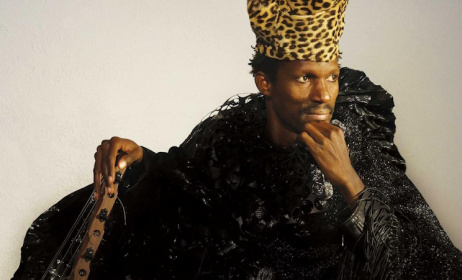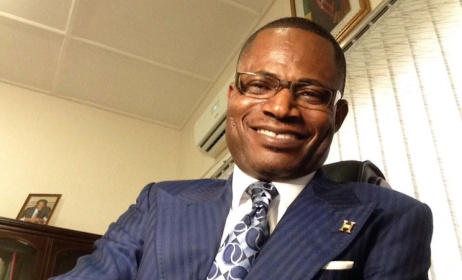Azadus: Passion, memory and faith
Before taking photos, Azadus asks to wear his Cherubim and Seraphim white garment. We are at Ayo Ni O, a famous parish of the Cherubim and Seraphim Movement at Sanya, Lagos, where he is a chorister.
 Azadus: Music is no longer about good songs and talent. Photo: IJ
Azadus: Music is no longer about good songs and talent. Photo: IJ
“I take God seriously," he says. True: this interview would have taken place nearly two months before. His robe is so large it swallows even his feet, yet it looks simple for a Cherubim and Seraphim costume.
Has he finished his job as a recording artist?
Azadus responds that art and talent are infinite but only lend themselves to circumstance and resources, lamenting that he has recorded over 20 songs but lacks the means to release them. “It’s no longer about good songs and talent," he says. "It’s about how much money you can throw around to grease palms. And then you need to make the kind of music that sells, which is often bad content. Music lovers are being cheated out of good content but they are not complaining.”
When I remind him that the industry has always been money-driven, he counters with: “There is money and there is the worship. We should have evolved beyond money and emergency fame. Think Lucky Dube. Think Asa and Fela. Think substance. A star should be a statement. We are making stars that are not iconic.”
The industry has made remarkable leaps, he admits, especially in sounds and beats. “But when music is solely instrumentation, talent is ruined. And for much of the music we celebrate these days, the producer is to be praised, not the artist. The magic is the sound, not the composition.”
In this church at least he has retained his fame. A greeting here, a wave there, a prostration in the mix. Our interview is subject to endless interruptions, including from selfie-seeking church members and the music of the church choir’s rehearsal from which he was excused for our current business. Extremely, down-to-earth, Azadus acknowledges every admiration.
Three years ago, a photo of Azadus trended online, with blogs and internet users prating. He was standing with an okadaman, holding a nylon bag. “Azadus don broke”, went the gossip. “He went to buy Agege bread and akara at a junction,” wrote one blogger. He laughs it off now. “I don’t live a fake life. I’m real. I make and sell music, not drama and lifestyle.” The public makes heroes out of artists without their consent, which, he says, results in musicians fixating on PR rather than on good music. “That is why artists are using sex and show-off to distract. Using them to replace the real work.”
Here is a man with a grudge against a system of which he was an active part, who, however, understands that criticism isn’t enough. “I am building an app that can help young new acts bypass money and the music establishment to sell talent.”
The app will allow artists create an account, upload their work, and get rated by music consumers—all for free. Good music can find support and audience through the platform soon to be launched. Like a Nigerian Idol run on a social medium, the I Dare You App reflects the bold energy of the Azadus brand.
It was a brand whose name came from ebullience and rebellion. While with the music group, DEFOCLAN, Azadus was the stubborn, brave and disruptive force in the pack. Once, at the studio with his peers, his playful revolt was stalling the work at hand. “You are too hazardous,” yelled Alabai, the 'Ogbanje' crooner who was at the studio with the group. Azadus later thought deeply about the tag and decided to own it.
It is not clear whether the famous H-factor solecism of his native Yoruba tongue eclipsed the aitch in “Harzardous”. “Azardous!” he says, enunciating his stage name as he mops sweat off his neck. “I liked the sound but not the meaning." He kept the sound but coined an acronym: A Zealous And Determined Unbowed Soldier—AZADUS.
From banter, to a possible phonetic omission recreated to define a resilient spirit, a brand was born which, through hard work and talent, attained fame in the early 2000s. Between 2000 and 2006, he produced two albums and one EP, with hits like 'You Is The One', 'Madam', and 'See Trouble'. Except for TuFace, his contemporaries have receded both from limelight and from active music production. Blackface, Tony Tetuila, Eddy Remedies, Faze, Eedris Abdulkareem—either by youth or by the creative prosperity of others have all been edged out of the spotlight. Youth is pop music's talisman; otherwise it is talent which, by Azadus's argument, has become dispensable.
“We keep in touch, all of us," he says. "Or we hook up at the club. Even TuFace sef dey call me.”
Indeed, Azadus appeared in the music video for 2Baba's 'Gaaga Shuffle' last year. But with piracy, poor structures for royalties and other systemic failings, it is not clear how many Nigerian artists survive in the evening of fame. Whatever the situation now, it is far worse for those who started the currrent pop movement. They are hardly acknowledged and often mocked or attacked by the Twitter generation. They worked harder, earned less, and began a conversation to which they can no longer contribute.
Nigerian pop was led by Kennis Music, the record label that signed Azadus. Some say the label exploited young acts and monopolized the music but back then without the Kennis blessing, visibility was hard. “They were businesspeople and they gave me my due,” says Azadus, in response to the presumed exploitation. “They gave me a chance to express my talent and I’m grateful.” He smiles and pulls up his robe to reveal a clean pair of shoeless feet—a C&S requirement.
As he heads for the rehearsal long in wait, I recall musicians who started from the church but, unlike Azadus, haven't gone back—R. Kelly, Wizkid, Katy Perry, Simi, Usher. It is a long list. “This is where I grew up,” he says, walking towards the waiting choir. Soon he dissolves into a sea of flowing white garments singing unto the Lord. He is home and happy.


























Commentaires
s'identifier or register to post comments